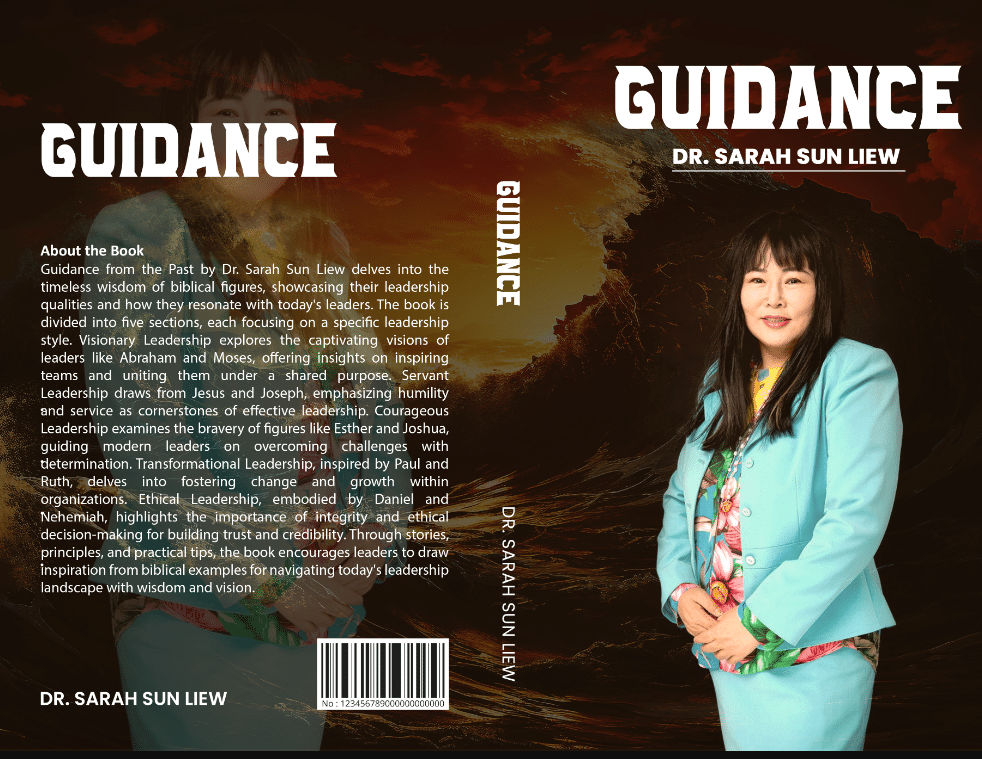By: Meridian Beverly Hills Investment & Legal Group
Visionary leadership is a powerful trait that has driven transformative change throughout history. It involves looking beyond immediate circumstances to inspire others and shape a meaningful future. In her book, Guidance from the Past, Vision for the Future: Biblical Leadership in Today’s World, Dr. Sarah Sun Liew explores the lives of Abraham, Moses, and David, highlighting how their leadership offers timeless insights for today’s leaders. This article delves into their journeys and the valuable lessons they provide for modern professionals.
Abraham: Faith and Future Vision
Abraham’s journey from Ur to the Promised Land serves as a classic example of visionary leadership driven by faith. When God called Abraham to leave his homeland, he embarked on a path into the unknown, guided only by a divine promise. His willingness to take this leap of faith is a hallmark of visionary leadership, showing the courage needed to pursue a long-term vision despite uncertainty.
Dr. Liew emphasizes that Abraham’s journey was not simply about reaching a physical destination; it represented a commitment to a vision extending beyond his own lifetime. His example highlights a crucial aspect of visionary leadership: the ability to inspire others through dedication to a future goal, even when the road ahead is unclear.
For today’s leaders, Abraham’s story underscores the importance of having a vision that transcends immediate challenges. By cultivating a clear purpose and fostering a long-term perspective, leaders can inspire their teams to embrace uncertainty and work toward shared goals. Abraham’s faith and commitment remind us that visionary leadership is about building foundations for future generations, encouraging contemporary leaders to inspire resilience and purpose in a rapidly changing world.

Photo Courtesy: Meridian Beverly Hills Investment & Legal Group
Moses: Visionary Leadership through Transformation
Moses’ leadership is marked by his ability to guide the Israelites from slavery in Egypt to freedom in the Promised Land. His vision of a liberated people was not merely about reaching a destination but involved transforming the Israelites’ mindset, fostering unity, and instilling a sense of collective purpose. Moses’ leadership style involved challenging the status quo, navigating obstacles, and creating a new identity for his people.
Dr. Liew highlights that Moses’ visionary leadership was rooted in his ability to communicate a compelling vision and drive significant change. His efforts went beyond immediate goals; they encompassed the development of a new community defined by shared values and purpose. Moses’ resilience through hardships and his commitment to a liberated people are profound examples of leading through change.
For modern leaders, Moses’ story emphasizes the importance of guiding teams through transformation. Leaders must be able to articulate a vision that resonates with their teams and inspire them to overcome challenges. Moses’ ability to balance the immediate needs of his people with a long-term vision of freedom and unity offers valuable lessons for leading through periods of change. His example teaches today’s leaders the importance of fostering purpose and resilience, empowering teams to embrace new ways of thinking and working.
David: Visionary Leadership and Legacy
David’s journey from a shepherd to the king of Israel exemplifies the power of visionary thinking and the pursuit of a meaningful legacy. His vision for a united Israel and the establishment of Jerusalem as its capital were instrumental in shaping the nation’s future. David’s leadership was marked by his ability to see beyond immediate conflicts and work towards a lasting impact.
Dr. Liew’s exploration of David’s leadership underscores the significance of balancing short-term challenges with long-term goals. David’s focus on building a unified nation and creating a legacy illustrates the impact of visionary leadership in shaping the future. His efforts to make Jerusalem a center for worship and governance were pivotal in defining Israel’s identity.
Today’s leaders can learn from David’s example by focusing on creating a legacy that extends beyond their own tenure. By setting ambitious goals and pursuing visions aligned with their values, leaders can make a lasting impact. David’s resilience amidst challenges highlights the importance of perseverance and adaptability in leadership. His story inspires modern leaders to maintain a forward-looking perspective while addressing immediate needs, ensuring that their efforts contribute to a meaningful legacy.
Dr. Sarah Sun Liew’s Insights
In Guidance from the Past, Vision for the Future, Dr. Sarah Sun Liew provides a comprehensive analysis of how the visionary qualities of Abraham, Moses, and David remain relevant today. She emphasizes that visionary leadership involves cultivating a perspective that goes beyond current obstacles, fostering change, and creating a lasting legacy. Dr. Liew’s work reminds us that effective leadership is about envisioning possibilities, guiding through transformation, and inspiring future generations.
Dr. Liew’s book further underscores that visionary leadership is essential for navigating modern challenges, as leaders must balance long-term goals with immediate demands. Her insights into these historical figures illustrate how leaders can integrate a forward-thinking approach in their organizations, creating environments that encourage innovation, resilience, and growth.
Application in Modern Leadership
The lives of Abraham, Moses, and David offer practical insights that can enhance modern leadership practices:
- Future Vision and Faith: Abraham’s journey teaches leaders the importance of having a vision that transcends present challenges. Leaders who cultivate a purpose-driven approach can inspire teams to work toward collective goals, even when the path forward is uncertain.
- Transformation and Resilience: Moses’ story demonstrates the value of guiding teams through transformation. Leaders must articulate a vision that resonates with their teams, fostering a sense of unity and resilience as they embrace change.
- Legacy and Adaptability: David’s leadership highlights the importance of balancing immediate needs with long-term goals. By focusing on creating a meaningful legacy, leaders can ensure their efforts have lasting impact, building foundations for future success.
Dr. Liew’s Authorship, Recognition, and Media Influence
Dr. Sarah Sun Liew is an accomplished author, educator, and thought leader whose work has earned widespread acclaim. Her book, Guidance from the Past, Vision for the Future, provides in-depth insights into biblical leadership, offering valuable lessons for modern professionals. Featured in over 500 global publications, including The Wall Street Journal, Yahoo Finance, and Fox News, Dr. Liew’s work resonates with a broad audience, reaching individuals seeking guidance on visionary leadership.
Dr. Liew’s contributions have also garnered significant accolades. She was honored with the Menorah of Peace Award from The Institute of Noahide Code in 2023 for her dedication to promoting peace and community service. Additionally, she was named one of the “Top 15 Entrepreneurs Shaping the Business World” by International Business Times, celebrating her achievements in real estate and fintech through her leadership at Meridian Beverly Hills Realty and MPS Merchant Services Group Inc.
Through working with major media outlets like CEO Weekly, Los Angeles Wire, and Voyage New York, Dr. Liew shares her leadership insights on a global scale. Her media presence allows her to engage with diverse audiences, promoting visionary leadership principles that inspire resilience, transformation, and purpose-driven action.
Conclusion
The visionary leadership of Abraham, Moses, and David provides timeless insights for today’s leaders. Each of these figures demonstrated qualities that remain essential for effective leadership: a forward-looking perspective, the ability to lead through change, and a commitment to creating a lasting legacy. Abraham’s faith-driven vision, Moses’ capacity to guide through transformation, and David’s focus on building a meaningful legacy offer invaluable lessons for modern leaders.
Dr. Sarah Sun Liew’s Guidance from the Past, Vision for the Future highlights how these historical figures can guide today’s professionals in navigating challenges and inspiring positive change. By embracing visionary thinking, leading through transformation, and pursuing long-term goals, leaders can draw from the examples of Abraham, Moses, and David to make a lasting impact on their organizations and communities. Their legacy serves as a powerful reminder of the transformative potential of visionary leadership.
Published by: Annie P.








